
Cave Creek is a town in Maricopa County, Arizona, United States. It is part of the Phoenix metropolitan area. As of the 2020 census, the population of the town was 4,892.
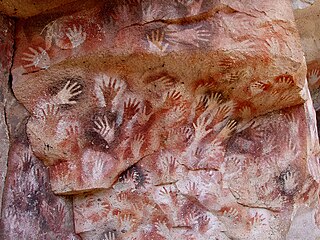
In archaeology, cave paintings are a type of parietal art, found on the wall or ceilings of caves. The term usually implies prehistoric origin, and the oldest known are more than 40,000 years old and found in the caves in the district of Maros. The oldest are often constructed from hand stencils and simple geometric shapes. More recently, in 2021, cave art of a pig found in Sulawesi, Indonesia, and dated to over 45,500 years ago, has been reported.

Anambra State is a Nigerian state, located in the southeastern region of the country. The state was created on 27 August 1991. Anambra state is bounded by Delta State to the west, Imo State to the south, Enugu State to the east and Kogi State to the north.
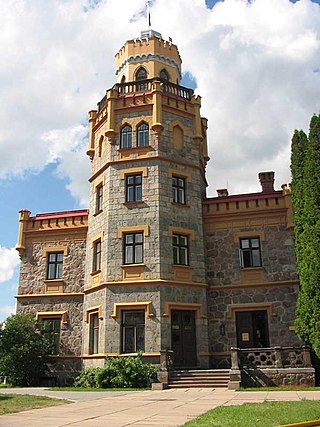
Sigulda is a town in the Vidzeme region of Latvia, 53 kilometres from the capital city Riga.

Orlu is the second-largest city in South East, Imo State, Nigeria, with a population of 420,600. It has a long history as the headquarters for the Organisation of African Unity (OAU) and humanitarian relief agencies during the Nigeria-Biafra Civil War. The city houses the Nigerian headquarters of the British Cheshire Home. It is the second most developed city after Owerri in Imo state.

The Cango Caves are located in Precambrian limestones at the foothills of the Swartberg range near the town of Oudtshoorn, in the Western Cape Province of South Africa. The principal cave is one of the country's finest, best known, and most popular tourist caves and attracts many visitors from overseas. Although the extensive system of tunnels and chambers go on for over 4 km, only about a quarter of this is open to visitors, who may proceed into the cave only in groups supervised by a guide.
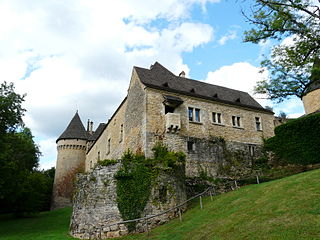
Montignac-Lascaux, is a commune in the Dordogne department, Nouvelle-Aquitaine, Southwestern France. It is a small town situated on the Vézère river and has been the capital of the canton of Montignac since 1790. In 2015 it became the capital of the newly created Canton de la Vallée de l'Homme. The poet Pierre Lachambeaudie (1806–1872) was born in the village.
Emekuku, is a town in Owerri North Local Government of Imo state in South-Eastern Nigeria.
Orumba South is a Local Government Area in Anambra State, south-eastern Nigeria. Umunze is the headquarters of Orumba South. Other towns that make up the local government are Akpujiogu (Akpu), Umuomaku, Eziagu, Ezira, Ihite, Nkerehi (Umuchukwu), Nawfija, Ogboji, Ogbunka, Owerre-Ezukala, Agbudu, Onneh, Isulo, and Enugwu-Umuonyia.

Hato Caves are show caves, publicly accessible since 1991 and a popular tourist attraction on the Caribbean island of Curaçao. The caves consist of marine coral limestone, which accumulated over millions of years and after sea levels had dropped were exposed to atmospheric corrosion and karstic processes. They are approximately 240 m (790 ft) long and cover an area of 4,900 m2 (53,000 sq ft).

Batu Caves is a mukim and town in Gombak District, Selangor, Malaysia. The town is experiencing an increase in residences due to a housing boom in the center of the city.
Ogbunka is a town in Orumba South Local Government Area of Anambra State, Nigeria. It has five villages: Awuka, Umunobe, Akwuoba, Agbala and Isiokpu.
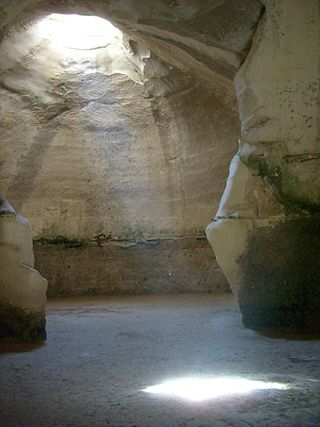
Beit Guvrin-Maresha National Park is a national park in central Israel, containing a large network of caves recognized by UNESCO as a World Heritage Site. The national park includes the remains of the historical towns of Maresha, one of the important towns of Judah during the First Temple Period, and Bayt Jibrin, a depopulated Palestinian town known as Eleutheropolis in the Roman era. However, Maresha and Bayt Jibrin are not part of the UNESCO site, which covers only the cave network.

The Cantabrian caves' unique location make them an ideal place to observe the settlements of early humans thousands of years ago. The magnificent art in the caves includes figures of various animals of the time such as bison, horses, goats, deer, cattle, hands and other paintings. Archaeologists have found remains of animals such as bears, the remains of arrows and other material indicating a human presence; these artifacts are now found mostly in the Regional Museum of Prehistory and Archaeology of Cantabria.

The Cave of Altamira and Paleolithic Cave Art of Northern Spain is a grouping of 18 caves of northern Spain, which together represent the apogee of Upper Paleolithic cave art in Europe between 35,000 and 11,000 years ago. In 2008, they were collectively designated a World Heritage Site by UNESCO.

Shuqba cave is an archaeological site near the Palestinian town of Shuqba in the West Bank, in the Ramallah and al-Bireh Governorate of the State of Palestine.
Amauju is an autonomous community of Imo State in southeastern Nigeria. The town is part of Imo State's Isu Local Government Area, zoned to Orlu Senatorial Zone.
Umuguma Town is Owerri West Local Government Area's headquarters. It is in Imo State, Nigeria. It evolved out of the old Owerri Local Government Area in 1996. Umuguma—a descendant of Arugo—is one of the 774 communities in the constitution of the Federal Republic of Nigeria as Local Government administrative
Umunumo is a town located in Ehime Mbano Local Government Area of Imo State, Nigeria. Umunumo consists of two major areas: Ibeafor and Ibenkwo. Each of these areas comprises five villages for a total of ten villages in Umunumo. The villages are Umuofeke, Umunagbala, Umuwosha, Umuokpara and Umuchima in Ibeafor and Duru Na Okiri, Ofor Owerre Ofor Ama, Umuanunu, Eze Na Obom and Umuaro in Ibenkwo.
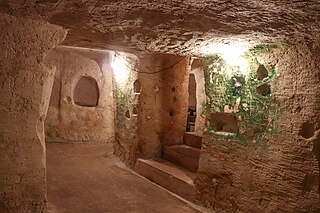
Matiate is an archaeological site underneath the town of Midyat, in Mardin province, Turkey. It is assumed to have been in use for 1,900 years, at its peak to have been inhabited by up to 70,000 people and is considered to be the largest cave system in the world.















